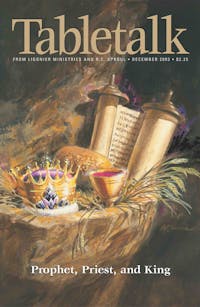
Request your free, three-month trial to Tabletalk magazine. You’ll receive the print issue monthly and gain immediate digital access to decades of archives. This trial is risk-free. No credit card required.
Try Tabletalk NowAlready receive Tabletalk magazine every month?
Verify your email address to gain unlimited access.
“The happy appearance of our Christ in the world has made for a new dispensation of civic virtue. Because the Lord abides forever, He has established His Throne for judgment, and He will judge the world in righteousness. He will surely execute judgment for the peoples with equity. The Lord also will be a Stronghold for the oppressed, a Stronghold in times of trouble. As a consequence, His earthly Vice-Regent must needs be a bastion of justice, mercy, and humility.” So said Wenceslaus of Bohemia (907–929).
The legendary generosity and charity of Good King Wenceslaus of Bohemia is no mere Yuletide fable. The young prince lived a life fraught with conflict and tragedy. Both his mother and grandmother, victims of court intrigue and anti-Christian conspiracy, were murdered when he was young. Likewise, he was the object of several plots, coups, and revolts—the last of which succeeded in ending his own short life and reign.
Yet despite such persistent opposition and adversity, he was a model Christian servant-leader. Indeed, in contrast to the hubris of many lords and princes of the day, he styled himself “the mere vice-regent of Christ’s reign and rule in this realm.” He believed it was his calling and responsibility as a first-generation Christian prince in the midst of a fiercely pagan culture “to reflect, however dimly, the offices of Christ in this world as a visible token of His happy appearance.” Thus, he reformed the penal system. He criminalized abuse of children and outcasts. He modeled virtue and humility. And he guarded the family and the church from attacks within and without.
His royal grandparents, Borivoy and his queen, Ludmila, had been converted and baptized despite the strong opposition of a number of noble Czech families who wished to maintain their control over the Pagan cultus. Borivoy and Ludmila had a son, Ratislav, who ultimately ruled the realm in their stead—a compromise with those powerful families designed to preserve me tenuous peace. In time, he married Drahomira, daughter of the chief of the Veletians, a Slav tribe. Together, they had twin sons, Wenceslaus and Boleslaus.
His godly grandmother raised Wenceslaus while Boleslaus remained in the court. As a result, the future king not only was raised as a Christian, he was able to witness first hand the sacrifices believers had to undergo—apart from all the political intrigue of the royal court.
Wenceslaus was still young when his father died in battle. His mother, Drahomira, served as the regent for her sons. Unfortunately, she was greatly influenced by the powerful pagan families still in Bohemia and allowed a series of fiercely anti-Christian policies to be implemented throughout the land. During the persecutions that broke out, Ludmila was assassinated while she was praying. After several months of struggle, Drahomira and Boleslaus were driven out and Wenceslaus was made ruler. He straightway announced the initiation of Scriptural standards of justice, mercy, and forgiveness—without prejudice—to all within the kingdom.
The poor particularly benefited from this happy estate. Wenceslaus understood that whenever God commanded the priestly nation of Israel to imitate Him in ensuring justice for the homeless, the alien, and the sojourner, He reminded them that they were once despised, rejected, and homeless themselves (Ex. 22:21–27; 23:9; Lev. 19:33–34). It was only by the grace and mercy of God that they had been redeemed from that low estate (Deut. 24:17–22). Thus, they were to serve. They were to protect. They were to speak the truth—in both word and deed. In short, they were to “reflect, however dimly, the offices of Christ in this world.”
Eventually, the young king married and had a son. Alas, the acclaim and good fortune became a bit too much for his exiled brother, Boleslaus, to bear. And to make matters worse, Wenceslaus’s son would now rule after the king died. Thus, Boleslaus decided to join a party of influential Pagan nobles that had formed against the crown.
One morning, as Wenceslaus made his way to church, he met Boleslaus. He struck Wenceslaus and they began to struggle. A number of the pagan lords ran up and killed Wenceslaus, who murmured as he fell at the chapel door: “Brother, may God forgive you.”
The people at once began to acclaim Wenceslaus a martyr. In time, Boleslaus, stricken with guilt and remorse, repented of his terrible deed and was gloriously converted. Amazingly, Wenceslaus by his death did what he was unable to do while he was living—he not only ensured the conversion of Bohemia, he was able to codify his deeds of mercy as a standard for Christian civic justice and mercy. By the beginning of the eleventh century, the attempt of Wenceslaus to model, however dimly, the offices of Christ had made his land a beacon light of the Gospel in the midst of this fallen world.
